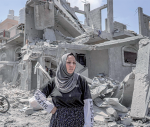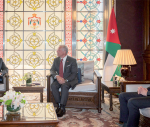You are here
Internally displaced Syrians fear coronavirus more than bombs and shells
Apr 15,2020 - Last updated at Apr 15,2020
The return to towns and villages in Syria's north-western Idlib province and in the north of Aleppo countryside of more than 100,000 displaced people has revealed that they fear the coronavirus more than bombs and shells. While hundreds of displaced have visited their homes with the aim of assessing damage, the returnees have shown their determination to stay by loading their possessions on lorries, pickups and cars bound for home. Life there is preferable to risking the virus while dwelling in camps in close proximity with thousands of displaced families.
They see the virus as capricious as well as highly contagious and deadly. They know that Idlib's broken healthcare facilities cannot rescue them from the grip of the virus if they and family members become seriously infected. Bombs and bullets are tangible dangers, while the virus is invisible and sneaks up on victims. Entire families can be wiped out within days.
The returnees may also believe it is safer to be at home than in camps near the Turkish border before the inevitable explosion between Al Qaeda's Hayat Tahrir Al Sham and the Turkish army and its Syrian surrogates. Since the March 5th deal between Ankara and Moscow for a ceasefire and de-escalation in Idlib, tension has arisen between the Turks and Tahrir Al Sham. Under the terms of the agreement, Turkey and Russia have pledged to reopen the M4 highway, which connects Aleppo city with the port of Latakia and to conduct joint patrols of sections of the route to allow traffic to resume along it.
However, the M4 bisects Tahrir Al Sham-held territory to the north and south of the highway. Consequently, that group and its takfiri allies have interfered with and blocked the patrols. Russia has demanded that Turkey take military action against these groups. Since Tahrir Al Sham has initiated confrontation, Turkey, which reinforced its military presence in Idlib after the beginning of the year, can no longer procrastinate and prevaricate.
Under the original September 2018 ceasefire accord between Ankara and Moscow, Turkey agreed to separate “moderate” opponents of the Syrian government from extremists and neutralise the latter. However, Turkey did not honour this commitment but, instead, made a deal with Tahrir Al Sham not to interfere in its governance of Idlib or prevent the group and its allies from conducting operations against the Syrian army, its partners, or Syrian civilian areas. However, Turkey angered the radical commanders by trying to recruit their fighters into the ranks of its client militia, the Free Syrian Army.
Tahrir Al Sham had accepted cooperation but not co-option. Tahrir Al Sham now brands the Turkish army an apostate force as it is, under the Turkish constitution, a secular formation and is prepared to take action against Turkish troops. It must not be forgotten that Tahrir Al Sham, originally Jabhat Al Nusra, is the takfiri twin of Daesh.
On March 19, two Turkish troops were killed in an attack by radicals at an M4 village. On April 13, radicals shot at Turkish troops near the M4. Avoiding conflict with Tahrir Al Sham and its radical allies is no longer possible because the group is being squeezed into smaller and smaller stretches of territory by the Syrian army, on one hand, and the Russian-Turkish agreement, on the other. This was inevitable. Turkey was never going to give preference to Tahrir Al Sham over Russia. Ankara simply used the radicals to gain time while it established in Idlib a dozen large military installations and dozens of smaller posts.
Having failed to achieve his war aim of toppling the Syrian government, Turkish President Recep Erdogan seeks to grab tracts of northern Syria. In this, he has succeeded in occupying the triangle around Jarablis and Al Bab, the north-western district of Afrin and a 120-kilometre long strip of territory along the border from Tel Abyad to Ras al-Ayn. But his eyes have always been on Idlib, on gaining an entire Syrian province.
Damascus's partners, Russia and Iran have strongly opposed Turkey's land grab and warned Erdogan that Turkey will, eventually, have to withdraw from Syria.
Turkey's relationship with Russia is far more important to Erdogan than the contest over Syria. Russia is one of Turkey's most important trading partners. The volume of trade last year reached $26.3 billion. Turkish contractors are involved in billions of dollars worth of projects in Russia. The Turk-Stream pipeline carrying Russian crude oil to Europe and the Akkuyu Nuclear Power Plant are major projects in the energy sector. More than seven million Russians visited Turkey last year, making them first among all tourists travelling to Turkey.
Although a Nato member, Turkey has bought and taken delivery of Russia's S-400 missile system, a move which alienated other alliance members. Finally, Erdogan has seen that Russia, as an external power, intends to assume a major role in the region while the US, under Donald Trump, has been erratic and unreliable. While Trump has made it clear he remains committed to the security of Israel, Saudi Arabia and the Gulf states, he has focused his short span of attention elsewhere. By contrast, Russian President Vladmiri Putin is steady and dependable.













